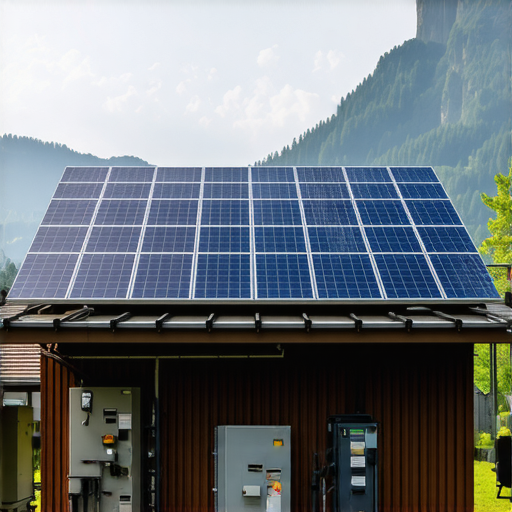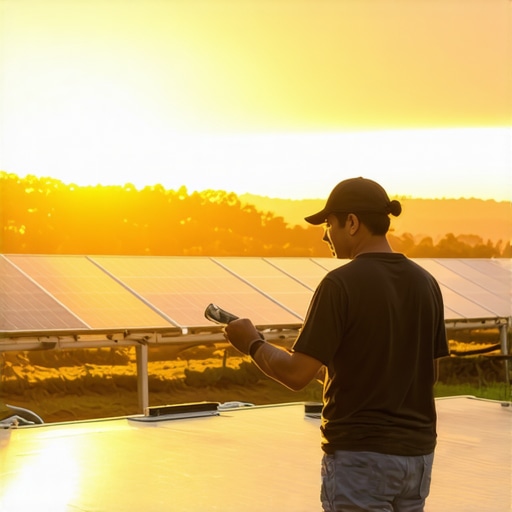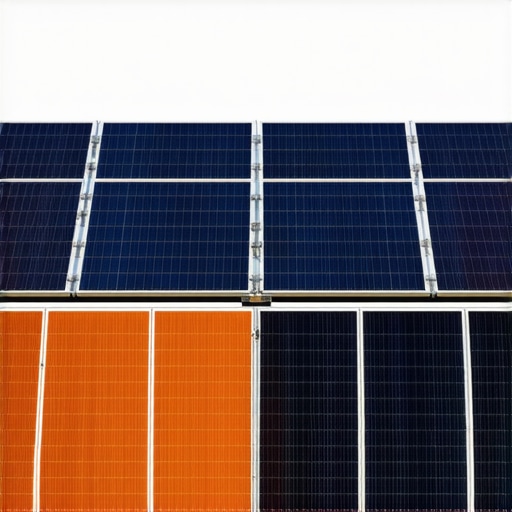My Journey into Off Grid Solar Power: Finding the Perfect Solar Kit
When I first decided to live off the grid, I felt a mix of excitement and overwhelm. I vividly remember wandering through various solar kit options, trying to understand what would truly meet my needs. It was a steep learning curve, but my experience taught me that choosing the right solar kit is crucial for sustainable energy independence. I want to share some personal insights and practical tips to help fellow off-grid enthusiasts navigate this process confidently.
Understanding Your Power Needs: More Than Just Numbers
Before diving into solar kit options, I realized I needed a clear picture of my energy consumption. How many devices do I run daily? What’s the total wattage? I learned that assessing my daily power usage was essential, which I did by tracking my energy needs over a week. This step helped me determine the size of the solar system I required. For detailed guidance on calculating your energy requirements, check out Master Off Grid Solar Systems.
Picking the Right Solar Panels: Efficiency Meets Durability
Next, I focused on selecting solar panels. I discovered that monocrystalline panels offered higher efficiency, which was important for my limited space. However, I also prioritized durability since my panels would be exposed to harsh weather. It was a balancing act—higher efficiency often comes with a higher price tag, but the longevity and performance were worth it. I found that reading reviews and consulting authoritative sources like the U.S. Department of Energy helped me make informed choices.
Battery Storage: Ensuring Power During Cloudy Days
One mistake I made early on was underestimating battery capacity. Off-grid living demands reliable storage, so I opted for deep-cycle batteries that could handle frequent cycles. I learned that a well-sized battery bank not only ensures continuous power but also prolongs the lifespan of my batteries. For more on building a sustainable battery bank, explore Battery Bank Basics.
Inverter Choices: Powering Your Off Grid Lifestyle
Choosing the right inverter was a revelation for me. I initially thought all inverters were similar, but I soon realized that pure sine wave inverters provide cleaner power for sensitive electronics. Maximizing inverter efficiency became a priority, especially since I wanted to run appliances smoothly. For advanced tips, I recommend reading about Maximizing Efficiency of Your Solar Inverter.
How Do I Know if a Solar Kit is Right for My Home?
What factors should I consider beyond just the initial cost?
Beyond price, I found that compatibility with my energy needs, system scalability, and ease of installation were critical. I also considered maintenance requirements and the availability of local support. It’s essential to choose a solar kit that fits both your current needs and future expansion plans. For a comprehensive overview, I recommend exploring Innovations in Off Grid Solar.
If you’re also on this journey, I’d love to hear your experiences or questions—feel free to share in the comments below!
Innovating with Modular Solar Systems: Flexibility for Off Grid Living
One aspect I soon discovered was the advantage of modular solar systems, which allow for easy expansion as your energy needs grow. This approach is especially beneficial for those who start small but anticipate future upgrades. Modular designs enable you to add more panels, batteries, or inverters without overhauling the entire system, saving both time and money. For instance, integrating a modular setup can align perfectly with your long-term sustainability goals, as detailed in Master Off Grid Solar Systems.
Understanding the Role of MPPT Charge Controllers
Another critical component I learned about was the MPPT (Maximum Power Point Tracking) charge controller. Unlike simpler PWM controllers, MPPT controllers optimize the power output from your solar panels, especially during variable weather conditions. This means more efficient energy harvesting, which is crucial when your system size is limited or when you’re relying heavily on solar power. Investing in a high-quality MPPT controller can significantly improve overall system performance and longevity. To explore this, see Maximizing Efficiency of Your Solar Inverter.
Practical Tips for System Maintenance and Troubleshooting
Maintaining an off-grid solar system might seem daunting at first, but I found that regular inspections and cleaning go a long way. Checking connections, cleaning dust off panels, and monitoring battery health ensure sustained performance. Additionally, understanding common issues like voltage drops or inverter errors empowers you to troubleshoot effectively. For detailed maintenance strategies, consider reading Battery Bank Basics and related expert resources. The key is to stay proactive instead of reactive, preventing problems before they escalate.
What Are the Future Trends in Off Grid Solar Technology?
How will innovations in energy storage and smart systems shape off-grid sustainability?
Looking ahead, the integration of smart technology and advanced energy storage solutions promises to revolutionize off-grid living. Innovations such as lithium iron phosphate batteries, which offer longer lifespan and safer operation, are becoming more accessible. Furthermore, smart monitoring systems enable real-time system diagnostics and remote management, making off-grid systems more reliable and user-friendly. According to U.S. Department of Energy, the future of off-grid solar is geared toward higher efficiency, scalability, and integration with sustainable energy networks. To stay ahead, it’s wise to keep an eye on emerging trends and adapt your system accordingly.
If you’ve encountered unique challenges or innovative solutions in your off-grid journey, I invite you to share your insights or questions in the comments. For those eager to deepen their understanding, exploring Innovations in Off Grid Solar can provide valuable inspiration and guidance.
Beyond the Basics: Navigating the Nuances of Off Grid Power Systems
As I delved deeper into my off-grid solar journey, I realized that mastering the technical aspects was only part of the equation. The real challenge often lies in understanding the subtle interplay between system components and environmental factors. For instance, I discovered that shading—even partial—can dramatically reduce panel efficiency, and that seasonal variations in sunlight require adaptable strategies. This insight pushed me to consider more advanced solutions, such as dynamic panel tilting or hybrid systems that incorporate wind or micro-hydro sources. Such intricacies make off-grid living both a science and an art, demanding continuous learning and adaptation.
How Do I Manage System Complexity Without Losing My Mind?
Managing a sophisticated off-grid solar setup can feel overwhelming at times. I found that breaking down the system into manageable parts—like focusing separately on energy generation, storage, and consumption—helped me maintain clarity. Regular maintenance routines, like inspecting connections and updating monitoring software, became vital habits. Additionally, I invested in comprehensive system monitoring tools that provide real-time data on performance metrics, helping me catch issues before they escalate. If you’re interested in optimizing your system’s efficiency and longevity, exploring Maximizing Efficiency of Your Solar Inverter offered me valuable insights. Remember, embracing a mindset of continuous improvement transforms complexity into mastery.
What Are the Ethical and Environmental Considerations in Off Grid Solar Adoption?
While my focus was initially on technical performance, I soon pondered the broader impact of my choices. From sourcing panels and batteries from responsible manufacturers to ensuring proper disposal or recycling at the end of their life cycles, sustainability became a core concern. I learned that choosing high-quality, durable components not only reduces long-term costs but also minimizes environmental footprint. Furthermore, integrating smart energy management aligns with global efforts to reduce carbon emissions and promote renewable energy. Engaging with communities and advocacy groups helped me stay informed about best practices, ensuring my off-grid system contributes positively to the environment and society. If you’re passionate about sustainability, I recommend exploring Innovations in Off Grid Solar for the latest trends and insights.
One of the most rewarding aspects of this journey has been witnessing firsthand how thoughtful system design can empower independence while respecting our planet. Every time I troubleshoot a system glitch or optimize energy flow, I feel a deeper connection to the sustainable future I am helping to build. I encourage you to share your experiences or questions—whether about technical challenges, ethical considerations, or innovative solutions—in the comments below. Together, we can foster a community of informed and responsible off-grid enthusiasts committed to shaping a resilient and eco-friendly energy landscape.
Harnessing Adaptive Technologies for Off Grid Resilience
As I delved deeper into the intricacies of off-grid solar systems, I realized that static configurations often fall short in addressing the dynamic environmental and usage conditions encountered in remote settings. Embracing adaptive technologies, such as smart energy management systems, has markedly enhanced my system’s resilience. These innovations allow real-time adjustments to energy flow, optimizing efficiency during variable sunlight and load fluctuations. According to a recent study by the National Renewable Energy Laboratory, integrating intelligent controls can boost system performance by up to 30%, a significant gain for those relying solely on renewable sources. Implementing these solutions has transformed my off-grid setup from a static to a self-regulating powerhouse, capable of adapting to changing conditions seamlessly.
Optimizing Energy Harvest Through Advanced Panel Technologies
Beyond basic panel selection, I explored cutting-edge solar panel technologies that maximize energy capture. Bifacial panels, for example, utilize reflective surfaces to harness albedo effect, capturing sunlight from both sides and increasing energy yield without additional land use. Coupling these with solar tracking systems further enhances performance by maintaining optimal angles relative to the sun’s position. While initially costly, the long-term gains in energy production and system efficiency justify the investment. For a comprehensive overview of these innovations, review Innovations in Off Grid Solar. Integrating such advanced panel systems has allowed me to reduce the number of panels needed, saving space and costs, while maintaining robust energy security.
What Are the Hidden Challenges of Scaling Off Grid Solar Systems?
How can advanced planning mitigate future limitations and ensure sustainable expansion?
Scaling an off-grid solar system isn’t merely a matter of adding more panels and batteries; it involves complex planning to prevent bottlenecks and inefficiencies. One challenge I faced was ensuring that the inverter and charge controllers could handle increased loads without overheating or degradation. I found that modular systems, designed with scalability in mind, provide a safeguard against obsolescence and capacity constraints. Exploring Master Off Grid Solar Systems has been invaluable in understanding how to future-proof my setup. Properly assessing electrical infrastructure, environmental impacts, and potential load growth ensures that expansion aligns with my sustainability goals and avoids costly retrofits down the line. This proactive approach transforms a simple installation into a resilient, long-term energy solution.
Engaging with Community Expertise and Open-Source Innovations
One of the most enriching aspects of my journey has been connecting with the off-grid community, exchanging insights, and adopting open-source innovations. Platforms like GitHub host projects that optimize energy management algorithms and develop low-cost, high-efficiency hardware components. Such collaborations democratize access to cutting-edge technology, making sustainable off-grid living more achievable for diverse communities. Engaging in forums and local workshops has also provided practical troubleshooting techniques and maintenance tips that are tailored to specific regional challenges. If you’re eager to deepen your understanding or contribute, I highly recommend exploring the collaborative projects highlighted in Innovations in Off Grid Solar. Sharing knowledge accelerates innovation and fosters a resilient, inclusive off-grid movement.
Integrating Environmental Stewardship into System Design
As I refined my off-grid system, I became increasingly conscious of its environmental footprint beyond just energy production. I prioritized sourcing components from manufacturers committed to sustainable practices, ensuring minimal ecological impact during manufacturing and disposal. Incorporating recycled materials and designing for end-of-life recycling has become a core principle. Additionally, I adopted eco-friendly maintenance routines, such as using non-toxic cleaning agents for panels and advocating for responsible waste disposal. These steps align with the broader goal of harmonizing technology and ecology, creating a system that not only sustains my needs but also conserves the environment. For insights into sustainable practices, check Innovations in Off Grid Solar. My journey underscores that true resilience in off-grid living includes environmental integrity as a foundational element.
This image captures the innovative integration of bifacial panels and solar tracking systems I installed to maximize efficiency in my remote location. The combination of advanced technology and adaptive design has been pivotal in achieving my off-grid energy independence, demonstrating the practical application of cutting-edge solutions in real-world settings. If you’re interested in exploring these advanced strategies further, I encourage you to share your experiences or questions in the comments below. Together, we can push the boundaries of sustainable off-grid living and foster a community of innovative, environmentally conscious energy enthusiasts.
Things I Wish I Knew Earlier (or You Might Find Surprising)
Hidden Costs Are Real
When I started my off-grid solar journey, I underestimated the importance of hidden costs like maintenance, upgrades, and replacement parts. These expenses can sneak up on you and impact your long-term sustainability. Learning from others, I now budget a little extra for unexpected needs, ensuring my system remains reliable without surprises.
The Power of Community
Sharing experiences with a community of off-grid enthusiasts has been invaluable. Forums, local workshops, and online groups provided insights I couldn’t find in manuals. Engaging with others who share your passion accelerates learning and helps troubleshoot tricky issues more effectively.
Flexibility Is Key
Initially, I chose a rigid system that didn’t allow for easy expansion. Over time, I realized that modular and scalable setups save money and frustration. Planning for future growth from the start makes your off-grid energy journey smoother and more adaptable.
Environmental Impact Matters
Beyond just generating power, I became conscious of the environmental footprint of my components. From sourcing sustainable materials to recycling old batteries, small choices add up to a more eco-friendly lifestyle. It’s rewarding to know your energy independence aligns with caring for the planet.
Resources I’ve Come to Trust Over Time
- U.S. Department of Energy: This authoritative source offers comprehensive guides and latest research on solar technology, helping me stay informed about innovations and best practices.
- National Renewable Energy Laboratory (NREL): Their studies and reports on renewable energy performance and trends have been a goldmine for understanding system efficiencies and future prospects.
- Off Grid Solar Forums (like SolarPanelTalk): Community-driven platforms where real-world problems and solutions are exchanged, making complex topics more approachable and practical.
- Manufacturer Websites (like Renogy or Renogy): Providing detailed product specs, user manuals, and support, these sites help me choose quality components confidently.
Parting Thoughts from My Perspective
Embarking on an off-grid solar adventure has been one of the most rewarding experiences of my life. The journey taught me that understanding the nuances of solar systems—like choosing the right panels, batteries, and controllers—is crucial, but equally important is embracing the community and continuous learning. Every challenge is an opportunity to improve and adapt, making your off-grid lifestyle sustainable and fulfilling. If this resonates with you, I’d love to hear your thoughts or experiences. Share it with someone who might find it helpful, and remember—your off-grid journey is uniquely yours, so trust your insights and keep exploring!


